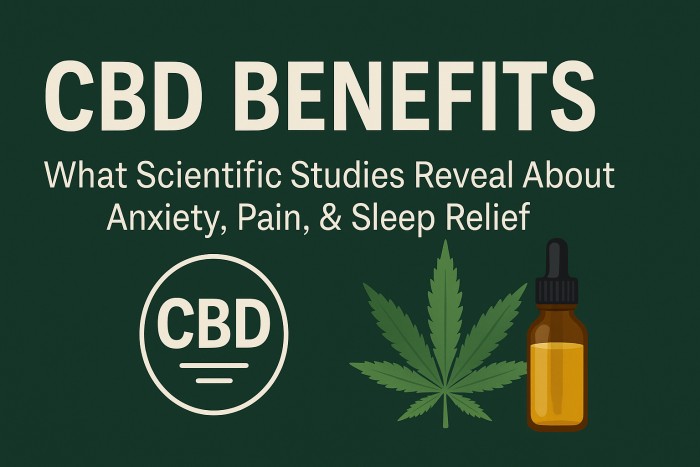CBD Benefits For Anxiety, Pain, and Sleep: What Science Says
- Anxiety Relief: Research suggests CBD may reduce anxiety symptoms, with studies showing 60–79.2% improvement in patients, though more long-term trials are needed.
- Pain Management: CBD may help with specific pain types like fibromyalgia and neuropathy, but evidence for general chronic pain is limited and mixed.
- Sleep Improvement: Some studies indicate CBD can enhance sleep, especially in those with anxiety or pain, but results are inconsistent, and benefits may be small.
- Safety: CBD is generally well-tolerated, but side effects like drowsiness or drug interactions are possible, and product quality varies.
- Controversy: Due to the lack of FDA regulation and variable product quality, study outcomes create uncertainty, so caution and medical advice are recommended.
Understanding CBD’s Potential
Cannabidiol (CBD), a non-psychoactive compound from cannabis, is popular for its potential to ease anxiety, pain, and sleep issues without causing a “high.”
Studies show promise, but results differ, and more research is needed to confirm benefits and optimal doses.
Anxiety Benefits
Studies, like a 2018 case series, found 79.2% of patients had less anxiety after a month of CBD use.
Other research supports CBD for disorders like social anxiety, but long-term effects are unclear.
Pain Benefits
CBD may reduce pain in conditions like fibromyalgia or neuropathy, with some studies showing significant relief.
However, it’s less effective for general chronic pain, and findings vary.
Sleep Benefits
CBD might improve sleep, especially for those with anxiety or pain, but evidence is mixed.
Some trials show better sleep quality, while others find no significant effect compared to alternatives like melatonin.
Proceed with Caution
Always choose lab-tested CBD products and consult a doctor, as CBD can interact with medications.
The unregulated market means quality varies, so research brands carefully.
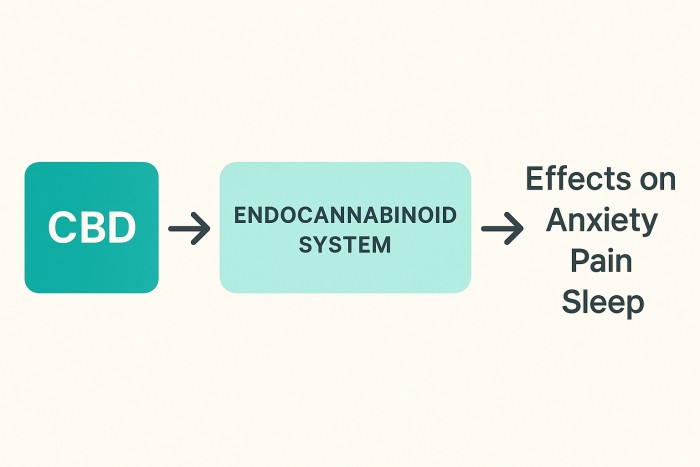
Introduction
Cannabidiol (CBD), a non-psychoactive compound derived from the cannabis plant, has surged in popularity for its potential to alleviate anxiety, pain, and sleep disorders.
Unlike tetrahydrocannabinol (THC), CBD does not cause a “high,” making it an appealing option for those seeking natural remedies.
However, the scientific evidence supporting CBD’s benefits is varied, with some studies showing promise while others highlight limitations.
This comprehensive article synthesizes findings from key scientific studies to explore CBD’s effectiveness for anxiety, pain, and sleep relief, offering insights into its potential, safety, and areas needing further research.
Understanding CBD and Its Mechanism
CBD interacts with the body’s endocannabinoid system (ECS), a network of receptors that regulates mood, pain, and sleep.
By modulating ECS activity and influencing serotonin receptors, CBD may reduce anxiety, inflammation, and pain perception.
Its non-psychoactive nature makes it suitable for therapeutic use, but the lack of standardized dosing and regulation complicates its application.
Research, such as a 2019 review, highlights CBD’s calming effect on the central nervous system, driving interest in its potential benefits.
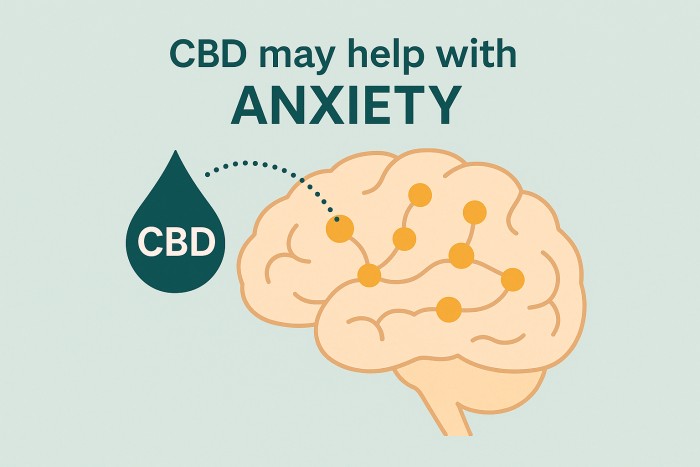
CBD for Anxiety
Anxiety disorders, affecting millions globally, are a primary focus of CBD research due to its anxiolytic properties.
Key Studies
- A 2018 case series in The Permanente Journal studied 72 adults with anxiety or sleep issues. After one month of CBD (25–175 mg/day), 79.2% reported reduced anxiety, with sustained improvements over three months. Also, 66.7% had improved sleep scores within the first month.
- A 2015 review in Neurotherapeutics found strong preclinical and clinical evidence supporting CBD for generalized anxiety disorder (GAD), social anxiety disorder (SAD), post-traumatic stress disorder (PTSD), and panic disorder when given acutely. However, chronic dosing studies are scarce.
- A 2020 systematic review (Journal Of Clinical Medicine Research) found that acute CBD use may reduce anxiety symptoms, shows potential benefits for psychotic and substance use disorders, and is generally well-tolerated, but inconsistent dosing and study bias limit firm conclusions.
- A 2021 survey of 387 CBD users found 42.6% used it for anxiety, with 86.5% reporting reduced anxiety levels.
Implications and Limitations
These studies suggest CBD can significantly reduce anxiety, particularly in acute settings.
However, the lack of long-term trials and standardized dosing limits definitive conclusions.
Most studies use doses of 25–600 mg/day, but optimal amounts vary by individual and condition severity.
Researchers call for more RCTs to establish guidelines.
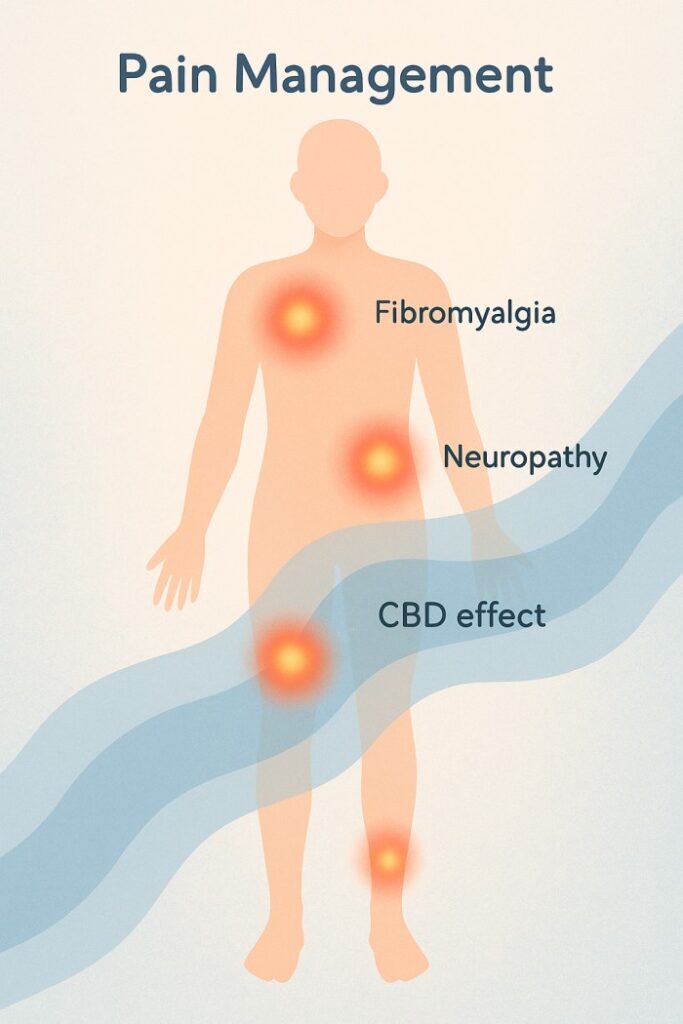
CBD for Pain
Chronic pain affects quality of life, and CBD’s anti-inflammatory and analgesic properties make it a candidate for pain management.
Key Studies
- A 2022 systematic review in Pain and Therapy looked at how cannabinoids, including CBD, work for long-term chronic pain across 19 different conditions. Overall, they didn’t find strong proof that cannabinoids reduced pain better than a placebo. However, they did find meaningful pain relief for people with fibromyalgia and complex regional pain syndrome (CRPS-I). On the other hand, cannabinoids didn’t seem to help with pain from conditions like irritable bowel syndrome (IBS) or chronic chest pain.
- A 2020 study in Current Pharmaceutical Biotechnology tested topical CBD oil for peripheral neuropathy, reporting significant reductions in intense pain, sharp pain and cold, itchy sensations compared to placebo.
- A 2019 meta-analysis of 25 studies on cannabinoids for pain found medium-to-large effect results.
- A 2022 meta-analysis on cannabinoids for neuropathic pain reported a significant pain reduction.
Implications and Limitations
CBD shows promise for specific pain types, particularly fibromyalgia and neuropathy, but its effectiveness for general chronic pain is limited.
Topical applications may be more effective for localized pain.
Doses in studies range from 2.5–40 mg/day, but variability in pain types and study designs complicates conclusions.
More long-term RCTs are needed to clarify CBD’s role in pain management.

CBD for Sleep
Sleep disorders, including insomnia, are common, and CBD’s calming effects have prompted research into its sleep benefits.
Key Studies
- A 2019 review in Current Psychiatry Reports suggested CBD may help with REM sleep behavior disorder (RBD) and excessive daytime sleepiness, while nabilone may reduce PTSD-related nightmares and improve sleep in chronic pain patients.
- A 2022 systematic review in Cannabis and Cannabinoid Research concluded that CBD may be beneficial in alleviating the symptoms of insomnia.
- A 2018 case series reported 66.7% of patients had improved sleep after one month of CBD (25–175 mg/day), but benefits fluctuated over time.
Implications and Limitations
CBD may enhance sleep, particularly in those with anxiety or pain, but evidence for primary insomnia is weak.
Doses of 25–175 mg/day are common in studies, often taken before bed.
The small magnitude of benefits and inconsistent results underscore the need for more rigorous trials focusing on sleep as a primary outcome.
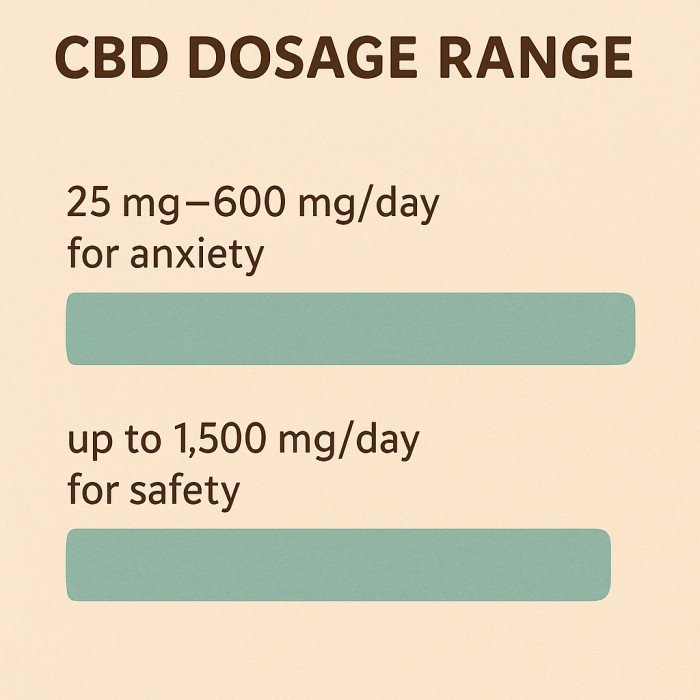
Safety and Side Effects
CBD is generally safe, with a 2020 review in Frontiers in Pharmacology reporting no significant toxicity at doses up to 1,500 mg/day.
Common side effects include:
- Drowsiness
- Dry mouth
- Changes in appetite
- Diarrhea (at high doses)
CBD can interact with medications metabolized by liver enzyme CYP3A4, such as blood thinners, as noted by Harvard Medical School.
The unregulated CBD market poses risks, with a study finding 26% of products contained less CBD than labeled.
Choose third-party tested products to ensure quality and safety.
Conclusion
Scientific studies suggest CBD may offer benefits for anxiety, pain, and sleep, but the evidence varies by condition.
Anxiety research shows strong support, with 60–79.2% of patients reporting relief, though long-term data is lacking.
Pain studies indicate efficacy for fibromyalgia and neuropathy but limited benefits for general chronic pain.
Sleep research is mixed, with small improvements in some cases but no clear advantage over alternatives like melatonin for insomnia.
Given the unregulated market and potential drug interactions, consult a healthcare provider before using CBD.
Choose lab-tested CBD products that are THC-Free, monitor dosage, discuss CBD use with your doctor.
As research progresses, clearer guidelines may emerge, but for now, cautious use and informed decision-making are key.
Key Citations
- Cannabidiol in Anxiety and Sleep: A Large Case Series
- Cannabidiol as a Potential Treatment for Anxiety Disorders
- Cannabidiol as a Potential Treatment for Anxiety Disorders: A Review
- Systematic Review and Meta-analysis on Cannabinoids for Chronic Pain
- Topical Cannabidiol Oil for Peripheral Neuropathy: A Randomized Trial
- Cannabis, Cannabinoids, and Sleep: A Review of the Literature
- Medical Cannabis and Cannabinoids for Impaired Sleep: A Meta-analysis
- Use of Cannabidiol in the Management of Insomnia: A Systematic Review
- Non-Psychoactive Cannabinoid Formulations for Sleep Improvement
- Pharmacokinetics of Cannabidiol in Humans: A Systematic Review
- FDA on Cannabis and CBD Products: Consumer Updates
- Cannabidiol (CBD): What We Know and What We Don’t
- Reasons for Cannabidiol Use: A Cross-Sectional Study
- Study Shows Most CBD Sleep Aids Are Mislabeled
- Cannabinoids for Pain: A Meta-Analysis and Meta-Regression
- Cannabinoids for Neuropathic Pain: A Systematic Review and Meta-analysis
About The Author
Joseph Powers is the founder of Legal CBD Idaho and a trusted voice in Idaho’s hemp and CBD space. With over a decade of experience in cannabis compliance and education, Joseph is committed to helping Idahoans confidently understand what’s legal, what works, and where to buy safe, effective CBD products in the state.
A Twin Falls local, Joseph brings a consumer-first approach to navigating Idaho’s strict laws around hemp-derived CBD. He personally reviews legal updates, verifies product claims, and explains everything in plain English—so you can make informed, stress-free decisions about your wellness.
Joseph is not affiliated with any CBD brand, ensuring every review and guide on this site is unbiased and rooted in facts, not hype. Whether you're just curious or looking for trusted products that meet Idaho’s 0.0% THC requirement, his goal is simple: to give you honest answers backed by research, not rumors.
Got a question about CBD in Idaho? Email Joseph directly at joe@legalcbdoilidaho.com.

